高一英语重点知识汇总汇总
高一英语知识点总结大全(非常全面)
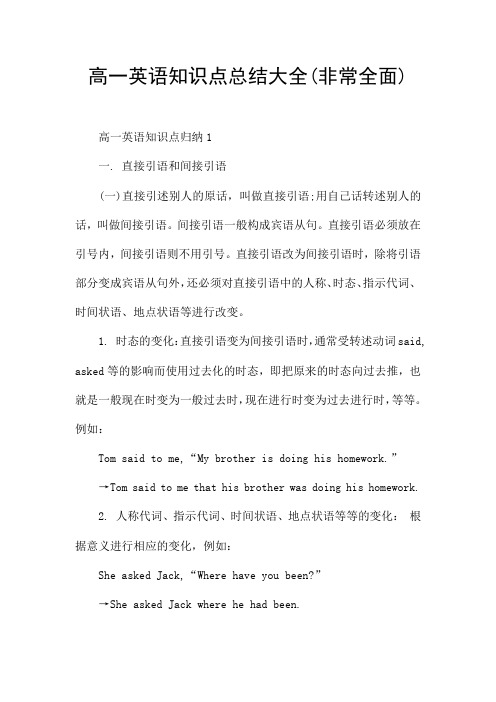
高一英语知识点总结大全(非常全面)高一英语知识点归纳1一. 直接引语和间接引语(一)直接引述别人的原话,叫做直接引语;用自己话转述别人的话,叫做间接引语。
间接引语一般构成宾语从句。
直接引语必须放在引号内,间接引语则不用引号。
直接引语改为间接引语时,除将引语部分变成宾语从句外,还必须对直接引语中的人称、时态、指示代词、时间状语、地点状语等进行改变。
1. 时态的变化:直接引语变为间接引语时,通常受转述动词said, asked等的影响而使用过去化的时态,即把原来的时态向过去推,也就是一般现在时变为一般过去时,现在进行时变为过去进行时,等等。
例如:Tom said to me,“My brother is doing his homework.”→Tom said to me that his brother was doing his homework.2. 人称代词、指示代词、时间状语、地点状语等等的变化:根据意义进行相应的变化,例如:She asked Jack,“Where have you been?”→She asked Jack where he had been.He said,“These books are mine.”→He said that those books were his.(二)直接引语改为间接引语时,都使用陈述语序,但是因为原句的句式不同,所以变成间接引语时所用的连词会有所不同。
直接引语如果是一般疑问句,用连接词whether或if;如果是特殊疑问句,则用疑问词引导间接引语。
转述的动词一般用asked,可以在其后加上一个间接宾语me, him, her, us等。
如:She said,“Is your father at home?”→She asked me if/whether my father was at home.“What do you do every Sunday?”My friend asked me.→My friend asked me what I did every Sunday.直接引语如果是祈使句,改为间接引语时,要将祈使句的动词原形变为带to的不定式,并在不定式的前面根据原句的语气(即请求或命令)加上ask, tell, order等动词,如果祈使句为否定式,则在不定式前加not。
高一英语必修一必背知识点总结5篇
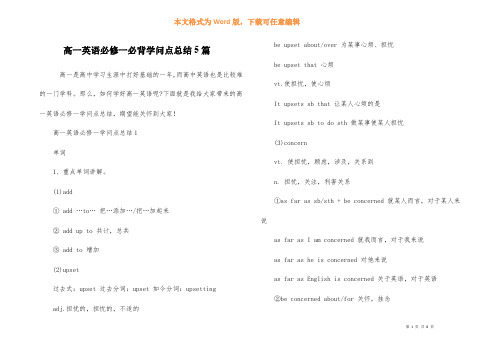
高一英语必修一必背学问点总结5篇高一是高中学习生涯中打好基础的一年,而高中英语也是比较难的一门学科。
那么,如何学好高一英语呢?下面就是我给大家带来的高一英语必修一学问点总结,期望能关怀到大家!高一英语必修一学问点总结1单词1、重点单词讲解。
(1)add① add …to…把…添加…/把…加起来② add up to 共计,总共③ add to 增加(2)upset过去式:upset 过去分词:upset 如今分词:upsettingadj.担忧的,担忧的,不适的 be upset about/over 为某事心烦、担忧be upset that 心烦vt.使担忧,使心烦It upsets sb that 让某人心烦的是It upsets sb to do sth 做某事使某人担忧(3)concernvt. 使担忧,顾虑,涉及,关系到n. 担忧,关注,利害关系①as far as sb/sth + be concerned 就某人而言,对于某人来说as far as I am concerned 就我而言,对于我来说as far as he is concerned 对他来说as far as English is concerned 关于英语,对于英语②be concerned about/for 关怀,挂念have no concerned about/for③be concerned in/with 涉及到,与…有关have no concerned in/with(4)go through①经受,患病,忍受 go through one difficulty after another.经受一个又一个困难。
②认真检查,审查 go through your paper 检查你的试卷。
③扫瞄,翻阅 go through all the related reference.扫瞄相关资料。
④通过,穿过=pass through go through a great forest.穿过一片大森林。
高一英语必考知识点全部

高一英语必考知识点全部英语学习对于高中生来说,是一项必修课程,也是重要的考试内容。
下面就是为大家总结的高一英语必考知识点。
一、语法知识点1. 动词时态与语态英语中有多种时态,例如一般现在时、一般过去时、现在进行时等。
了解各个时态的构成和用法,以及被动语态的形式与应用。
2. 从句结构与用法了解主从复合句的构成和关系,包括定语从句、名词性从句和状语从句等。
掌握从句引导词的用法和位置。
3. 并列连词与关联词熟悉常用的并列连词如and、but、or以及关联词如because、although等。
掌握它们的用法和连接不同句子成分的能力。
4. 句型转换与句子结构调整学会对句子进行转换和调整,如同义句转换、被动语态转换、间接引语转换等。
二、词汇知识点1. 常用词汇掌握常用的英语单词和短语,包括名词、动词、形容词和副词等。
积累词汇的同时,了解它们的词性和用法。
2. 同义词和反义词学会识别和运用同义词和反义词,提高语言的表达能力。
注意它们的用法和搭配。
3. 词组与固定搭配了解一些常见的词组、习语和固定搭配,并能正确运用于实际语境中。
三、阅读理解知识点1. 阅读技巧掌握阅读理解的技巧,包括略读、扫读和精读。
了解如何根据问题和选项进行有针对性的阅读。
2. 理解文章结构学会分析文章的结构,包括段落的顺序、主题句和支持句的关系等。
能够准确地找到文章的主旨和关键信息。
3. 掌握常见题型熟悉并掌握常见的阅读理解题型,如选择题、填空题、判断题和配对题等。
了解不同题型的解题思路和答题技巧。
四、写作技巧知识点1. 作文结构掌握作文的结构,包括引言、正文和结论。
确保文中的段落有机衔接,逻辑清晰。
2. 表达思想能够清晰地表达自己的思想和观点,运用适当的词汇和句子结构。
写作时要注意语法和拼写错误。
3. 文章连贯性写作时注意段落和句子之间的连贯性,使用适当的过渡词和连接词,使文章更易读懂,逻辑更清晰。
五、听力技巧知识点1. 听力细节在听力理解中,要注意捕捉细节信息,如数字、日期、时间等。
高一英语的基础知识点归纳
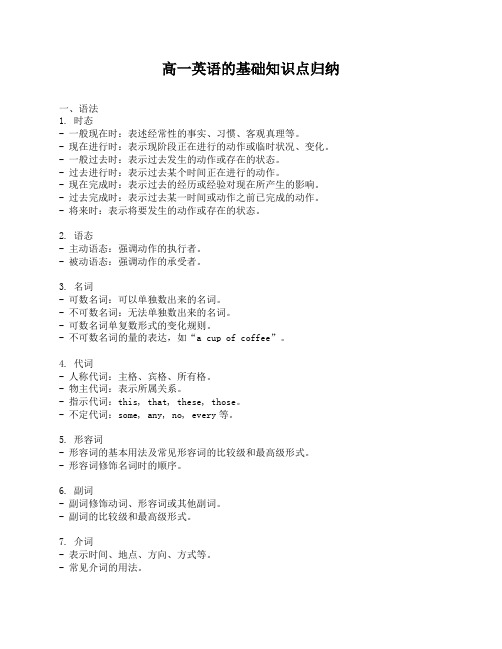
高一英语的基础知识点归纳一、语法1. 时态- 一般现在时:表述经常性的事实、习惯、客观真理等。
- 现在进行时:表示现阶段正在进行的动作或临时状况、变化。
- 一般过去时:表示过去发生的动作或存在的状态。
- 过去进行时:表示过去某个时间正在进行的动作。
- 现在完成时:表示过去的经历或经验对现在所产生的影响。
- 过去完成时:表示过去某一时间或动作之前已完成的动作。
- 将来时:表示将要发生的动作或存在的状态。
2. 语态- 主动语态:强调动作的执行者。
- 被动语态:强调动作的承受者。
3. 名词- 可数名词:可以单独数出来的名词。
- 不可数名词:无法单独数出来的名词。
- 可数名词单复数形式的变化规则。
- 不可数名词的量的表达,如“a cup of coffee”。
4. 代词- 人称代词:主格、宾格、所有格。
- 物主代词:表示所属关系。
- 指示代词:this, that, these, those。
- 不定代词:some, any, no, every等。
5. 形容词- 形容词的基本用法及常见形容词的比较级和最高级形式。
- 形容词修饰名词时的顺序。
6. 副词- 副词修饰动词、形容词或其他副词。
- 副词的比较级和最高级形式。
7. 介词- 表示时间、地点、方向、方式等。
- 常见介词的用法。
8. 连词- 并列连词:and, but, or等。
- 从属连词:because, although, when等。
9. 直接引语和间接引语- 直接引语表示说话人原话,引述时要用引号。
- 间接引语是对直接引语的转述。
10. 主谓一致- 单数主语用单数动词,复数主语用复数动词。
二、词汇1. 基础词汇- 常用单词的拼写、发音和意思。
2. 同义词和反义词- 同义词:具有相似意义的词语。
- 反义词:意义相反的词语。
3. 前缀和后缀- 前缀:在词的前面加上,改变词义或词性。
- 后缀:在词的后面加上,改变词义或词性。
4. 短语和习惯用语- 常用短语和习惯用语的意思和用法。
高一英语必背知识点汇总
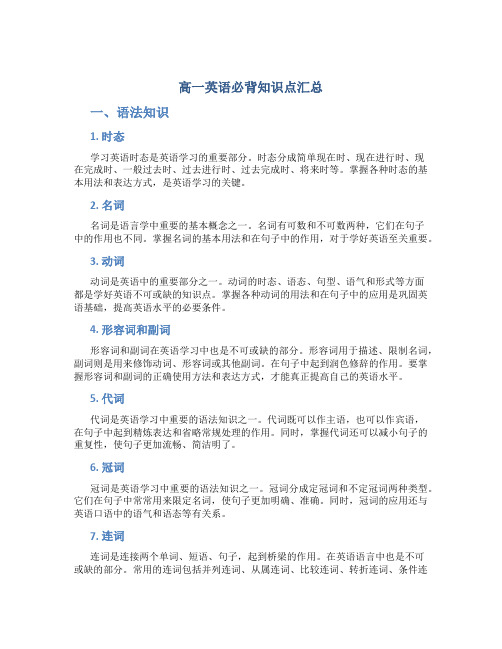
高一英语必背知识点汇总一、语法知识1. 时态学习英语时态是英语学习的重要部分。
时态分成简单现在时、现在进行时、现在完成时、一般过去时、过去进行时、过去完成时、将来时等。
掌握各种时态的基本用法和表达方式,是英语学习的关键。
2. 名词名词是语言学中重要的基本概念之一。
名词有可数和不可数两种,它们在句子中的作用也不同。
掌握名词的基本用法和在句子中的作用,对于学好英语至关重要。
3. 动词动词是英语中的重要部分之一。
动词的时态、语态、句型、语气和形式等方面都是学好英语不可或缺的知识点。
掌握各种动词的用法和在句子中的应用是巩固英语基础,提高英语水平的必要条件。
4. 形容词和副词形容词和副词在英语学习中也是不可或缺的部分。
形容词用于描述、限制名词,副词则是用来修饰动词、形容词或其他副词。
在句子中起到润色修辞的作用。
要掌握形容词和副词的正确使用方法和表达方式,才能真正提高自己的英语水平。
5. 代词代词是英语学习中重要的语法知识之一。
代词既可以作主语,也可以作宾语,在句子中起到精炼表达和省略常规处理的作用。
同时,掌握代词还可以减小句子的重复性,使句子更加流畅、简洁明了。
6. 冠词冠词是英语学习中重要的语法知识之一。
冠词分成定冠词和不定冠词两种类型。
它们在句子中常常用来限定名词,使句子更加明确、准确。
同时,冠词的应用还与英语口语中的语气和语态等有关系。
7. 连词连词是连接两个单词、短语、句子,起到桥梁的作用。
在英语语言中也是不可或缺的部分。
常用的连词包括并列连词、从属连词、比较连词、转折连词、条件连词等。
掌握多种连词的使用方法和表达方式,才能更好地理解英语文章,提高英语水平。
8. 数词英语中的数词种类繁多,包括基数词、序数词、分数等。
数词的应用范围很广,不仅仅包括数字的表达,还包括与数字相关的各种用法,如时间、日期、价格等。
学好数词对于英语学习至关重要。
9. 介词介词是英语语言中重要的部分之一,介词的应用范围广泛,表达方式独特。
高一英语必修一知识点归纳整理【优秀10篇】
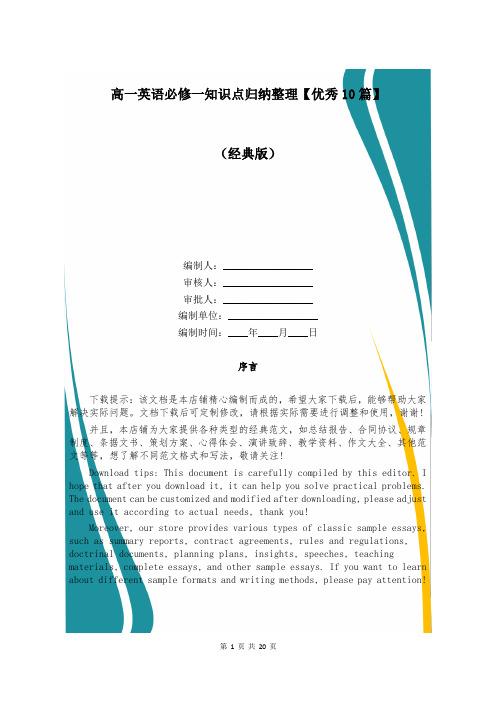
高一英语必修一知识点归纳整理【优秀10篇】(经典版)编制人:__________________审核人:__________________审批人:__________________编制单位:__________________编制时间:____年____月____日序言下载提示:该文档是本店铺精心编制而成的,希望大家下载后,能够帮助大家解决实际问题。
文档下载后可定制修改,请根据实际需要进行调整和使用,谢谢!并且,本店铺为大家提供各种类型的经典范文,如总结报告、合同协议、规章制度、条据文书、策划方案、心得体会、演讲致辞、教学资料、作文大全、其他范文等等,想了解不同范文格式和写法,敬请关注!Download tips: This document is carefully compiled by this editor. I hope that after you download it, it can help you solve practical problems. The document can be customized and modified after downloading, please adjust and use it according to actual needs, thank you!Moreover, our store provides various types of classic sample essays, such as summary reports, contract agreements, rules and regulations, doctrinal documents, planning plans, insights, speeches, teaching materials, complete essays, and other sample essays. If you want to learn about different sample formats and writing methods, please pay attention!高一英语必修一知识点归纳整理【优秀10篇】在课堂上我们一定要全神贯注,在认真听讲和合作探究的过程中,掌握知识、技能和方法。
最全高一英语知识点总结归纳5篇

最全高一英语知识点总结归纳5篇高一英语是很多同学的噩梦,学问点众多而且杂,对于高一的新生们很不友好,我建议同学们通过总结学问点的方法来学习英语,这样可以提高学习效率。
下面就是我给大家带来的高一英语学问点,希望能关怀到大家!高一英语学问点总结11. win, beat, defeat 表示获胜、取胜的词语(1) win v. 赢,获胜,接竞赛或奖项win a game / a prize / an honor / a race. / Our team won the game 8 to 7. / He won by five points. / He won her love at last. / He won the first place in the competition.(2) beat + 对手,表战胜(尤指体育竞赛) I can easily beat him at golf.(3) defeat 表战胜,接对手The enemy was defeated in the battle.2. in the end, finally, at last三者均可表示“(经过周折、等待、耽误)最终,最终”之意。
不同的是:finally 一般用在句中动词前面,而at last 与in the end 的位置则较为灵敏;三者中at last 语气最为剧烈,且可单独作为感叹句使用。
After putting it off three times, we finally managed to have a holiday in Dalian. / At last he knew the meaning of life. / At last! Where on earth have you been? / But in the end he gave in.另外,finally还可用在列举事项时,引出最终一个内容,相当于lastly。
高一英语必修一知识点归纳
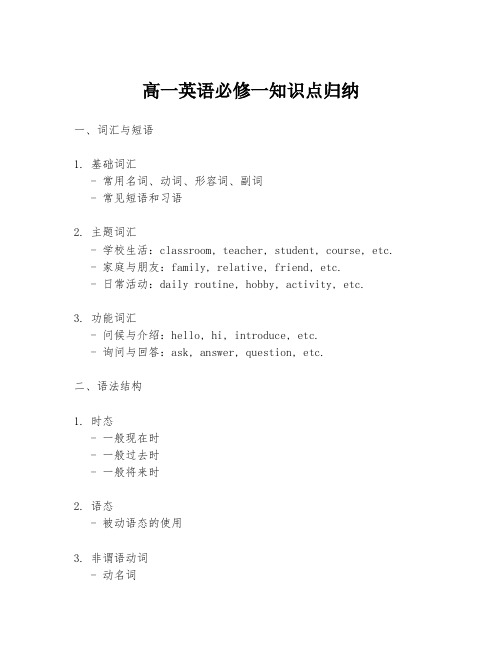
高一英语必修一知识点归纳一、词汇与短语1. 基础词汇- 常用名词、动词、形容词、副词- 常见短语和习语2. 主题词汇- 学校生活:classroom, teacher, student, course, etc. - 家庭与朋友:family, relative, friend, etc.- 日常活动:daily routine, hobby, activity, etc.3. 功能词汇- 问候与介绍:hello, hi, introduce, etc.- 询问与回答:ask, answer, question, etc.二、语法结构1. 时态- 一般现在时- 一般过去时- 一般将来时2. 语态- 被动语态的使用3. 非谓语动词- 动名词- 分词(现在分词和过去分词)4. 句型- 简单句- 并列句- 复合句(定语从句、状语从句等)三、阅读理解1. 阅读技巧- 快速阅读(Skimming)- 精读(Scanning)- 推断与预测2. 文章类型- 记叙文- 议论文- 说明文3. 常见问题类型- 事实细节题- 主旨大意题- 推理判断题四、写作技巧1. 写作格式- 书信- 日记- 议论文2. 写作要点- 明确主题 - 逻辑清晰 - 语言准确3. 写作技巧- 使用连接词 - 段落结构 - 多样句式五、听力技巧1. 听力策略- 预测- 注意力集中 - 关键词捕捉2. 听力材料- 对话- 短文- 讲座3. 听力题型- 信息匹配 - 细节理解 - 推理判断六、口语表达1. 发音- 音标学习- 单词发音- 句子重音和语调2. 日常对话- 问候与告别- 邀请与应答- 请求帮助3. 讨论与演讲- 表达观点- 支持论点- 结束语请注意,以上内容是一个基础框架,您可以根据具体的教学大纲和学生的学习情况进行调整和补充。
在Word文档中,您可以使用标题、子标题、列表和表格等格式化工具来使文档更加清晰和专业。
此外,为了确保文档的可编辑性和可操作性,建议使用清晰和标准的字体,如Times New Roman或Arial,并确保文档的页边距、行距和段落格式符合标准文档的要求。
高一英语重点知识归纳

高一英语重点知识归纳一、词汇知识点高一英语词汇的重要性不言而喻,它是英语学习的基础。
以下是一些建议掌握的词汇知识点:1.动词时态:掌握一般现在时、一般过去时、一般将来时以及现在进行时等基本时态。
2.被动语态:理解并能运用被动语态表达意思。
3.情态动词:学会使用情态动词表达推测、建议、能力等含义。
4.名词:熟悉常见名词,如学科、职业、交通工具等。
5.形容词和副词:学会用形容词和副词修饰名词,提高表达的准确性。
6.短语:掌握常用短语,如动词短语、介词短语等,以提高表达能力。
二、语法知识点1.句子结构:了解英语句子结构,主谓宾、主系表等。
2.名词性从句:学习名词性从句的构成和用法,如主语从句、宾语从句等。
3.定语从句:掌握定语从句的引导词和用法。
4.状语从句:学习状语从句的类型和用法,如时间状语从句、地点状语从句等。
5.虚拟语气:了解虚拟语气的用法,如表示建议、愿望等。
三、听力技巧提高英语听力能力,需要多听、多练。
以下是一些建议:1.听英语歌曲、电影、新闻等,锻炼听力技能。
2.做英语听力练习,如教材配套的听力练习题。
3.参加英语角或与外国朋友交流,提高实际听力水平。
4.制定听力计划,坚持每天练习。
四、阅读理解技巧阅读理解是英语考试的重要组成部分,以下是一些建议提高阅读理解能力的方法:1.扩大词汇量,了解词汇的用法和含义。
2.学会快速阅读,抓住文章主旨。
3.练习阅读不同类型的文章,如故事、科普、议论等。
4.做阅读理解练习,总结解题技巧。
五、写作技巧1.熟悉不同类型的作文,如议论文、说明文、叙述文等。
2.学会使用恰当的句式和词汇。
3.注意文章结构,明确主旨。
4.多做写作练习,不断提高写作水平。
六、口语练习建议1.模仿英语口语发音,练习标准发音。
2.参加英语角或与外国朋友交流,提高口语实际运用能力。
3.学习英语口语表达,如日常用语、情景对话等。
4.制定口语练习计划,坚持每天练习。
七、学习策略和习惯1.制定学习计划,合理安排学习时间。
高一第一册英语总结知识点
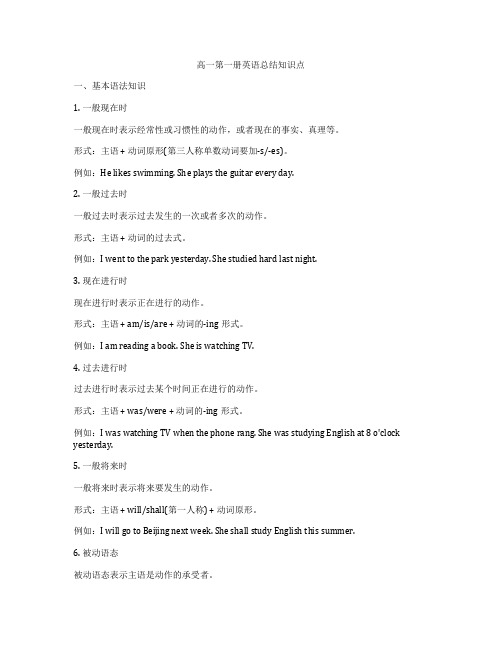
高一第一册英语总结知识点一、基本语法知识1. 一般现在时一般现在时表示经常性或习惯性的动作,或者现在的事实、真理等。
形式:主语 + 动词原形(第三人称单数动词要加-s/-es)。
例如:He likes swimming. She plays the guitar every day.2. 一般过去时一般过去时表示过去发生的一次或者多次的动作。
形式:主语 + 动词的过去式。
例如:I went to the park yesterday. She studied hard last night.3. 现在进行时现在进行时表示正在进行的动作。
形式:主语 + am/is/are + 动词的-ing形式。
例如:I am reading a book. She is watching TV.4. 过去进行时过去进行时表示过去某个时间正在进行的动作。
形式:主语 + was/were + 动词的-ing形式。
例如:I was watching TV when the phone rang. She was studying English at 8 o'clock yesterday.5. 一般将来时一般将来时表示将来要发生的动作。
形式:主语 + will/shall(第一人称) + 动词原形。
例如:I will go to Beijing next week. She shall study English this summer.6. 被动语态被动语态表示主语是动作的承受者。
形式:主语 + am/is/are + 动词的过去分词。
例如:The book is read by me. The cake was eaten by the children.7. 可数名词和不可数名词可数名词是指可以用数目来计算的名词。
不可数名词是指不能以数目计算的名词。
例如:book/books, water, rice。
高一英语重点知识归纳

高一英语重点知识归纳一、语法知识1. 时态:包括一般现在时、一般过去时、一般将来时等;2. 语态:包括主动语态和被动语态;3. 从句:包括名词性从句、定语从句和状语从句;4. 倒装句:包括完全倒装和部分倒装;5. 并列连词:包括and, but, or等;6. 强调句:通过强调句式来强调某个信息;7. 虚拟语气:表示假设、愿望或建议等情况;8. 直接引语和间接引语:在引述他人的话时的用法;9. 感叹句:表示强烈的情感或感叹的句子结构。
二、词汇知识1. 同义词和反义词:词义相同或相反的词汇;2. 词形变化:包括名词、动词、形容词和副词的各种形式;3. 词组搭配:常用的固定搭配词组;4. 词义辨析:词义相近但用法不同的词汇;5. 词根词缀:通过词根和词缀来理解和记忆单词的意思。
三、阅读理解1. 主旨大意题:通过阅读文章,抓住文章的中心思想;2. 细节理解题:根据文章中的细节信息,回答相关问题;3. 推理判断题:根据文章的暗示或逻辑关系,做出推理判断;4. 词义猜测题:通过上下文推断词语的意思;5. 主题段落题:根据段落的标题和首尾句,确定段落的主题;6. 标题选取题:根据文章的内容和结构,选择合适的标题。
四、写作技巧1. 话题作文:根据给定的话题,展开表达自己的观点和思考;2. 图表描述:根据图表中的信息,进行描述和分析;3. 事件叙述:根据所给的事件,进行叙述和分析;4. 书信写作:根据给定的情境,写一封信表达自己的建议、感谢或抱怨等;5. 表格填写:根据给定的表格,填写相关信息;6. 口头表达:通过口头表达的方式,进行演讲、讨论或辩论等。
五、听力技巧1. 主旨理解:通过听力材料,抓住主要信息和中心思想;2. 细节理解:根据听到的细节信息,回答相关问题;3. 推理判断:通过听力材料的暗示或逻辑关系,做出推理判断;4. 对话场景:根据对话的内容和语境,理解对话的背景和情景;5. 笔记记录:通过听力材料,进行笔记记录和整理。
高一英语必考知识点大全

高一英语必考知识点大全一、语法知识点1. 时态与语态:包括一般现在时、一般过去时、一般将来时、现在进行时、过去进行时、现在完成时、过去完成时等各种时态的用法,以及被动语态的构成和用法。
2. 代词与人称:包括人称代词、指示代词、不定代词、反身代词等的用法和形式变化。
3. 冠词与数词:包括不定冠词、定冠词、零冠词、基数词、序数词等的用法。
4. 形容词与副词:包括形容词的比较级和最高级的用法、副词的用法和修饰方式。
5. 介词与连词:包括介词的用法和常见搭配,连词的分类及用法。
6. 名词:包括名词的单复数形式变化、所有格的用法、可数名词和不可数名词的区别等。
7. 动词:包括动词的不同形式、时态、语态、非谓语动词的用法和形式等。
8. 句型:包括简单句、并列句、复合句、直接引语和间接引语的转换等。
二、词汇知识点1. 同义词与近义词:包括词义相近但用法略有不同的词语,需要注意区别。
2. 反义词与形近词:包括词义相反的词语,以及拼写或发音相近但意义完全不同的词语。
3. 词根与词缀:包括从词根和词缀出发分析词义和构词法的能力。
4. 习惯用语与固定搭配:包括一些常见的习惯用语和固定搭配的用法。
5. 常用短语与表达方式:包括一些常用的固定短语和表达方式,如感谢信的开头结尾语句等。
三、阅读理解技巧1. 主旨大意与细节理解:能够准确把握文章的主旨大意,理解文章中的细节信息。
2. 推理判断与逻辑推理:能够根据文章的逻辑关系和上下文进行推理和判断。
3. 词义猜测与上下文推断:能够通过上下文的提示和线索推断出生词或难词的词义。
4. 阅读策略与速读技巧:能够灵活运用各种阅读策略和速读技巧提高阅读效率。
四、写作技巧1. 写作结构与篇章连贯:能够合理安排文章的结构和段落,使篇章连贯流畅。
2. 语法与词汇运用:能够正确使用各种语法结构和词汇,避免冗长和重复。
3. 表达准确与逻辑清晰:能够准确表达自己的观点和意见,逻辑清晰,条理清楚。
4. 书信、议论文等不同文体的写作技巧:能够根据不同的写作要求,熟练运用不同的写作技巧和表达方式。
高一英语重点知识点汇总
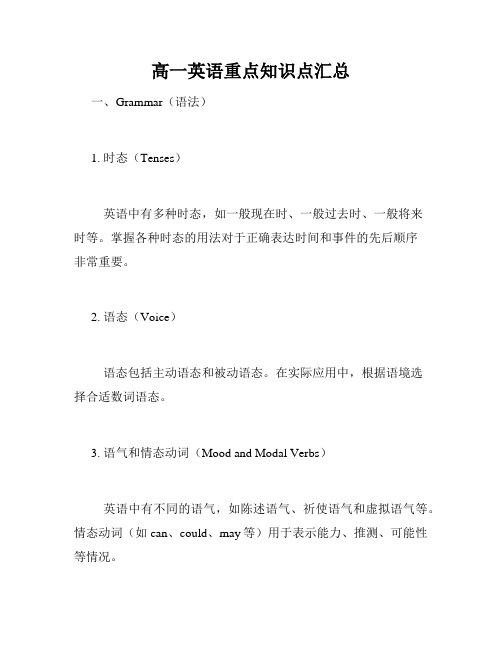
高一英语重点知识点汇总一、Grammar(语法)1. 时态(Tenses)英语中有多种时态,如一般现在时、一般过去时、一般将来时等。
掌握各种时态的用法对于正确表达时间和事件的先后顺序非常重要。
2. 语态(Voice)语态包括主动语态和被动语态。
在实际应用中,根据语境选择合适数词语态。
3. 语气和情态动词(Mood and Modal Verbs)英语中有不同的语气,如陈述语气、祈使语气和虚拟语气等。
情态动词(如can、could、may等)用于表示能力、推测、可能性等情况。
4. 名词性从句(Noun Clauses)名词性从句可以充当句子中的一个成分,如主语、宾语、表语等。
常见的名词性从句有主语从句、宾语从句、表语从句和同位语从句。
5. 定语从句(Adjective Clauses)定语从句用来修饰名词或代词,并且必须紧跟在被修饰的名词或代词后面。
在定语从句中,关系代词(如who、which、that)和关系副词(如when、where、why)的选择十分重要。
6. 状语从句(Adverbial Clauses)状语从句用来修饰句子中的动词、形容词或副词,表示时间、原因、条件、目的、方式等。
常见的状语从句有时间状语从句、原因状语从句、条件状语从句、目的状语从句等。
7. 倒装句(Inversion)倒装句是英语中常见的语法结构之一,包括完全倒装和部分倒装。
倒装句在特殊情况下使用,需掌握其用法和变换规则。
二、Vocabulary(词汇)1. 同义词和反义词(Synonyms and Antonyms)同义词是指意思相同或相近的词语,反义词则指意思相反的词语。
积累并灵活运用同义词和反义词有助于丰富语言表达。
2. 合成词(Compound Words)合成词是由两个或两个以上的词组成的,有时候具有独特的意义。
了解合成词的构成和用法,对提高词汇量和理解能力很有帮助。
3. 词根、词缀和派生词(Roots, Prefixes, and Suffixes)许多词汇都可以通过加入词根、词缀或派生词来产生新的意义。
高一英语主要知识点

高一英语主要知识点一、语法部分1. 时态和语态在英语中,时态和语态非常重要。
常见的时态有一般现在时、一般过去时、现在进行时、现在完成时等。
语态主要包括主动语态和被动语态。
2. 名词名词是英语中的基本词类之一,可以指人、事物、地点、抽象概念等。
常见的名词类型包括可数名词和不可数名词,以及单数形式和复数形式等。
3. 代词代词在句子中可以替代名词,用来指代特定的人或物。
常见的代词类型有人称代词、物主代词、指示代词、相互代词等。
4. 形容词和副词形容词用来描述名词,副词则用来修饰动词、形容词或其他副词。
它们可以用来表达人或物的性质、特征、状态等。
5. 介词和连词介词用来表示人或物之间的关系,如时间、地点、原因等。
连词则用来连接句子、短语或单词,使句子结构更加完整。
6. 动词动词是英语中最重要的词类之一,表示动作、状态或存在。
常见的动词形式包括及物动词和不及物动词、动词的进行时和完成时等。
二、阅读部分1. 阅读理解高一英语的阅读理解主要考查学生对文章主旨、细节、推理和观点等方面的理解能力。
学生需要掌握正确阅读和理解文章的技巧。
2. 完型填空完型填空也是高一英语中常见的题型。
学生需要根据上下文的意思选择正确的单词或短语来填空,同时要注意上下文的逻辑关系。
三、写作部分1. 句子和段落结构高一英语写作时,学生需要注意句子和段落的结构。
句子的结构要简单明了,段落的结构要有逻辑性,内容要有条理。
2. 词汇和句型运用写作时,学生需要运用到丰富的词汇和句型。
可以通过阅读和积累来提升词汇量,同时要注意句子表达的准确性和多样性。
3. 作文类型高一英语作文可以包括记叙文、议论文、说明文等不同类型。
学生需要根据题目要求选择合适的作文类型,并灵活运用相关的写作技巧和语言表达。
四、听力部分1. 听力材料高一英语听力主要包括听对话和听短文两部分。
学生需要通过听力材料来获取相关信息,理解对话或短文的主题、细节和态度等。
2. 听力技巧学生需要掌握一些听力技巧,如预测信息、抓关键词、注意听力材料中的转折词等。
高一英语重点知识归纳
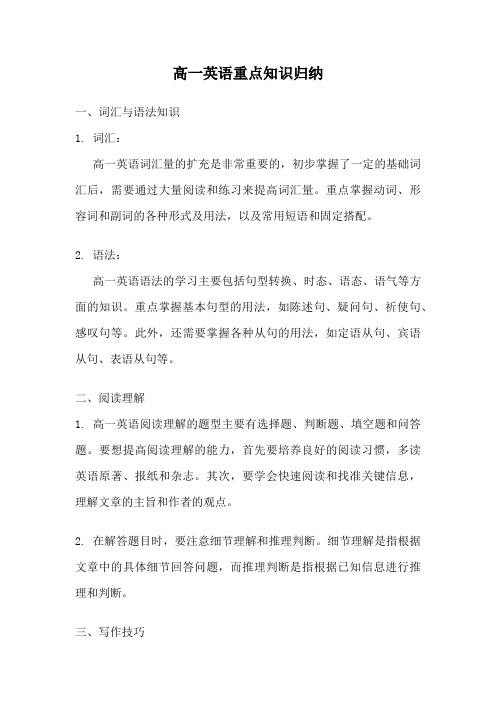
高一英语重点知识归纳一、词汇与语法知识1. 词汇:高一英语词汇量的扩充是非常重要的,初步掌握了一定的基础词汇后,需要通过大量阅读和练习来提高词汇量。
重点掌握动词、形容词和副词的各种形式及用法,以及常用短语和固定搭配。
2. 语法:高一英语语法的学习主要包括句型转换、时态、语态、语气等方面的知识。
重点掌握基本句型的用法,如陈述句、疑问句、祈使句、感叹句等。
此外,还需要掌握各种从句的用法,如定语从句、宾语从句、表语从句等。
二、阅读理解1. 高一英语阅读理解的题型主要有选择题、判断题、填空题和问答题。
要想提高阅读理解的能力,首先要培养良好的阅读习惯,多读英语原著、报纸和杂志。
其次,要学会快速阅读和找准关键信息,理解文章的主旨和作者的观点。
2. 在解答题目时,要注意细节理解和推理判断。
细节理解是指根据文章中的具体细节回答问题,而推理判断是指根据已知信息进行推理和判断。
三、写作技巧1. 写作的重点是要能够准确地表达自己的观点和想法。
要注意语法的正确性,尽量使用多样化的句式和词汇,避免重复和冗长。
2. 写作时要注意段落结构的合理安排,每个段落都应有一个明确的主题句,并围绕主题句展开论述。
同时,要注意使用恰当的过渡词和连接词,使文章的逻辑关系流畅清晰。
四、听力训练1. 高一英语听力训练主要包括听对话和听短文两种形式。
要提高听力能力,首先要培养良好的听觉习惯,多听英语材料,尤其是正常语速的英语材料。
2. 在听对话和听短文时,要注意抓住关键信息,如人物、地点、时间、事件等。
同时,要注意辨别说话者的语气和语调,以便更好地理解对话和短文的内容。
五、口语表达1. 高一英语口语表达主要包括日常交际用语和口头表达能力的培养。
要提高口语表达能力,首先要多加练习,多与他人进行英语对话。
可以通过模仿、角色扮演和实际应用等方式来提高口语能力。
2. 口语表达时要注意语音语调的准确性,尽量模仿标准的英语发音和语调。
同时,要注意语法的正确性和词汇的丰富性,以便能够更准确地表达自己的意思。
高一英语知识点大全集

高一英语知识点大全集1. 词汇与语法知识点高一英语学习的第一个关键是掌握词汇和语法知识。
以下是高一英语知识点的大全集,帮助学生巩固和扩展他们的词汇和语法能力。
1.1 名词- 可数名词与不可数名词- 单数名词与复数名词- 名词所有格的用法1.2 代词- 主格代词与宾格代词- 物主代词的用法- 反身代词的用法1.3 动词- 动词的时态(一般现在时、一般过去时、一般将来时)- 动词的语态(主动语态和被动语态)- 动词的不定式形式和用法1.4 形容词与副词- 形容词的比较级和最高级- 副词修饰动词、形容词和副词的用法1.5 介词和冠词- 常用介词的用法- 冠词的用法(定冠词和不定冠词)2. 句子结构知识点掌握好句子结构是高一学生提高英语写作和阅读能力的关键。
以下是一些常见的句子结构知识点。
2.1 主谓结构- 主谓一致的规则- 主语和谓语的位置2.2 宾语结构- 及物动词和不及物动词- 直接宾语和间接宾语的用法2.3 定语结构- 形容词和副词作定语的位置和用法2.4 状语结构- 时间状语、地点状语和方式状语的用法3. 阅读理解和写作技巧在高一英语学习中,阅读理解和写作技巧是非常重要的一部分。
以下是一些相关的知识点和技巧。
3.1 阅读理解技巧- 提取关键词和理解上下文- 掌握不同题型的解题方法- 善于使用排除法和推测法3.2 写作技巧- 写作时使用多种句型和词汇表达自己的意思- 注意段落结构和过渡词的使用- 使用适当的连接词和标点符号提高句子的连贯性4. 听力和口语技巧在学习英语中,听力和口语是两项非常重要的技能。
以下是一些高一英语学生需要掌握的听力和口语技巧。
4.1 听力技巧- 提前预习听力材料,了解主题和关键词- 注意听力材料中的生词和短语- 练习听力材料的速度和准确度4.2 口语技巧- 善于使用常用口语表达和日常用语- 练习与他人进行对话和讨论- 学会正确发音和语音语调5. 语言学习方法和学习资源学习英语还需要掌握一些学习方法和利用好学习资源。
高一英语重点知识点归纳整理
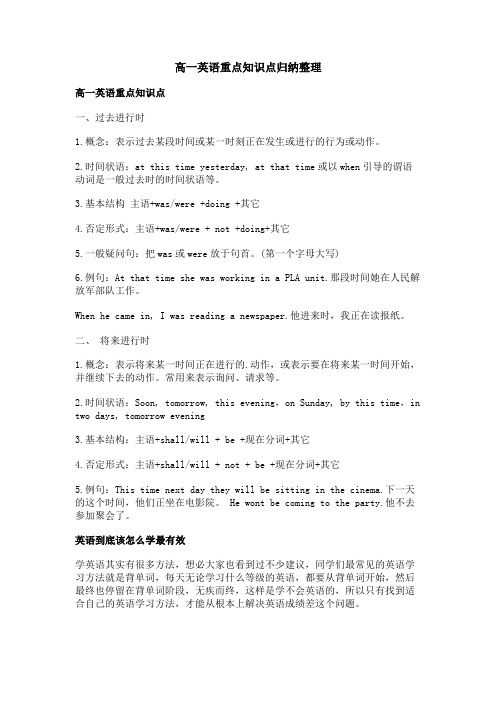
高一英语重点知识点归纳整理高一英语重点知识点一、过去进行时1.概念:表示过去某段时间或某一时刻正在发生或进行的行为或动作。
2.时间状语:at this time yesterday, at that time或以when引导的谓语动词是一般过去时的时间状语等。
3.基本结构主语+was/were +doing +其它4.否定形式:主语+was/were + not +doing+其它5.一般疑问句:把was或were放于句首。
(第一个字母大写)6.例句:At that time she was working in a PLA unit.那段时间她在人民解放军部队工作。
When he came in, I was reading a newspaper.他进来时,我正在读报纸。
二、将来进行时1.概念:表示将来某一时间正在进行的.动作,或表示要在将来某一时间开始,并继续下去的动作。
常用来表示询问、请求等。
2.时间状语:Soon, tomorrow, this evening,on Sunday, by this time,in two days, tomorrow evening3.基本结构:主语+shall/will + be +现在分词+其它4.否定形式:主语+shall/will + not + be +现在分词+其它5.例句:This time next day they will be sitting in the cinema.下一天的这个时间,他们正坐在电影院。
He wont be coming to the party.他不去参加聚会了。
英语到底该怎么学最有效学英语其实有很多方法,想必大家也看到过不少建议,同学们最常见的英语学习方法就是背单词,每天无论学习什么等级的英语,都要从背单词开始,然后最终也停留在背单词阶段,无疾而终,这样是学不会英语的,所以只有找到适合自己的英语学习方法,才能从根本上解决英语成绩差这个问题。
高一英语知识点总结

高一英语知识点总结高一英语知识点总结1一.一般过去将来时1.概念:立足于过去某一时刻,从过去看将来,常用于宾语从句中.2.时间状语:The ne_t day (morning, year hellip;),the following month(week hellip;),etc.3.基本结构:主语+was/were +going to + do+其它;主语+would/should + do+其它4.否定形式:主语+was/were+not + going to + do; 主语+would/should + not + do.5.一般疑问句:was或were放于句首;would/should 提到句首.6.例句:He said he would go to Beijing the ne_t day.他说他第二天要去北京.I asked who was going there.我问,谁要去那里.二. 现在进行时1.概念:表示现阶段或说话时正在进行的动作及行为.2.时间状语:Now, at this time, days, etc. look. listen3.基本结构:主语+be +doing +其它4.否定形式:主语+be +not +doing+其它5.一般疑问句:把be动词放于句首.6.例句:How are you feeling today?你今天感觉如何?He is doing well in his lessons.在课上他表现得很好.高一英语知识点总结21.基础梳理achievement Quaker welfare project institute specialist specialize chimp campaign connection landmine organization behave behavior shade move off worthwhile nest bond observe childhood outspoken respect argue entertainment lead a hellip;life crowd crowd in inspire support look down on/upon refer audience by chance come aross career rate sickness intend emergency generation determination kindness considerate deliver carry on modest2.词语归纳1)achieve表示〝完成,到达〞.区别achieve,reach,gain:achieve着重表示达到一定目的的过程中所需要的技能,耐性和努力.reach指达到任何目标.目的或指达到发展过程中的某个阶段.gain强调经过奋斗才达到所期望的目标.优势或者有利地位.2)condition表示〝条件〞,condition为单数时,表示人/物所处的〝状态〞. conditions(复数)指一般情况,环境.in good/poor condition状况好/不好.out of condition状况不好.on condition that在 hellip; hellip;条件下,假使.on no condition决不.3)connection表示〝连接,关系〞.connections亲戚.in connection with与 hellip; hellip;有关.4)behave表示〝举止,举动,行为表现〞.behave oneself表现良好,行为良好.behave as起 hellip; hellip;作用,表现为 hellip; hellip;.5)worthwhile表示〝值得做的,值得出力的〞.句型It is worhtwhile doing/to do sth〝干 hellip; hellip;是值得的〞.6)observe表示〝观察,注意〞,可接省略to的不定式的复合结构,当observe用被动语态时,其后的不定式应回复to.observe后也可接由现在分词构成的复合结构.后接that从句,表示〝注意到,说〞.observe还可以表示〝遵守,庆祝〞.7)respect作动词,后直接跟宾语.respect oneself自重,自尊.作名词,表示〝尊重,尊敬〞.have/show respect for意为〝对 hellip; hellip;尊重/尊敬〞.have respect to注意,考虑.表示〝敬意,问候〞时,用复数形式,常与give,send,pay连用.in respect of sth就某方面而言.with respect to 涉及,关于.8)argue表示〝争论,辩论〞.argue with sb(about/for hellip;)(为/关于 hellip; hellip;)和某人辩论. argue about就某事而论.argue for/against hellip;辩论赞成hellip; hellip;/反对hellip; hellip;.argue back反驳.argue sb into/out of doing sth说服某人做/不做某事.9)inspire表示〝鼓舞,激发〞.inspire sb(to do sth)赋予某人灵感,启迪.inspire sb(with sth)/inspire sth in sb激励/鼓励某人的 hellip; hellip;.形容词inspired表示〝有创造力的,有雄心壮志的,受灵感启示的〞;形容词inspiring表示〝鼓舞人心的,使人感兴趣的〞._)support作及物动词,表示〝支撑,扶持,养活〞.作可数名词,表示〝支撑物,支持的人/物,赡养者,赞助金〞.作不可数名词,表示〝支持,养家,赡养〞.come to one rsquo;s support来支持某人.in support后备的,准备给予支援的.in support of支持,证明._)look down on/upon表示〝蔑视,瞧不起〞.也可以用look one rsquo;s nose at来表示.有关look的短语:look for寻找,期待 look forward to doing盼望做某事 look on hellip;as 把 hellip; hellip;看作look out朝外看,当心,注意,查出 look through浏览,仔细查看,审核look up查看,抬头看 look after照顾 look back on/to sth 追思,回顾look in(on sb)顺便访问 look into sth调查 look over sth 检阅,检查look to注意 look sb up and down上下打量某人_)e_plain作及物动词,表示〝解释,说明〞,常接名词,代词,从句作宾语,若表示〝向某人解释某事〞,应说e_plain sth to sb或e_plain to sb sth.e_plain oneself为自己的行为辩解.e_plain后接由连接代词或连接副词引导的不定式或短语作宾语._)strike表示〝打,击,敲〞.表示〝通过摩擦产生(火花,光亮).表示〝打动,引起,迷住,罢工〞.表示〝打〞时,常套用在〝动词+sb+介词+the+表示身体某一部位的名词〞句型中.strike to向 hellip; hellip;打去.strike for/against为争取/反对 hellip; hellip;而罢工.srike sb down把某人_,使某人丧命.strike on sth意为获得/发现某事.strike home击中要害._)consideration表示〝考虑,体谅〞.take sth into consideration考虑某事,体谅某事.leave sth out of consideration忽略某事,不重视某事.in consideration of sth作为对 hellip; hellip;的回报,考虑到._)deliver表示〝递送,释放,发表(演说)〞.deliver a baby接生.deliver on sth不负重望,履行诺言._)devotedevote hellip;to献身于 hellip; hellip;,专心于 hellip; hellip;.to是介词.devote oneself to献身于,致力于,专心于.形容词devoted表示〝忠实的,热爱的,全心全意的〞.be devoted to sb/sth 表示〝对某人/某物忠实(热爱,全心全意).3.语法主谓一致主谓一致是指:1) 语法形式上要一致,即单复数形式与谓语要一致.2) 意义上要一致,即主语意义上的单复数要与谓语的单复数形式一致.3) 就近原则,即谓语动词的单复形式取决于最靠近它的词语,一般来说,不可数名词用动词单数,可数名词复数用动词复数.但当不可数名词前有表示数量的复数名词时,谓语动词用复数形式.1 并列结构作主语时谓语用复数注意: 当主语由and连结时,如果它表示一个单一的概念,即指同一人或同一物时,谓语动词用单数,and 此时连接的两个词前只有一个冠词.2 主谓一致中的就近原则1) 当there be 句型的主语是一系列事物时,谓语应与最邻近的主语保持一致.2)当either hellip;or hellip;与neither hellip;nor,连接两个主语时,谓语动词与最邻近的主语保持一致. 如果句子是由here, there引导,而主语又不止一个时,谓语通常也和最邻近的主语一致.3 谓语动词与前面的主语一致当主语后面跟有with, together with, like, e_cept, but, no less than, as well as 等词引起的短语时,谓语动词与前面的主语一致.4 谓语需用单数1) 代词each和由every, some, no, any等构成的复合代词作主语,或主语中含有each, every, 谓语需用单数.2) 当主语是一本书或一条格言时,谓语动词常用单数.3) 表示金钱,时间,价格或度量衡的复合名词作主语时,通常把这些名词看作一个整体,谓语一般用单数.(用复数也可,意思不变).5 指代意义决定谓语的单复数1) 在代词what, which, who, none, some, any, more, most, all等词的单复数由其指代的词的单复数决定.2) 集体名词作主语时,谓语的数要根据主语的意思来决定.如family, audience, crew, crowd, class, company, committee等词后用复数形式时,意为这个集体中的各个成员,用单数时表示该个集体.但集合名词people, police, cattle, poultry等在任何情况下都用复数形式.3)有些名词,如variety, number, population, proportion, majority 等有时看作单数,有时看作复数.A number of +名词复数+复数动词.The number of +名词复数+单数动词.A number of books have lent out.The majority of the students like English.population的谓语动词形式与表语一致,一般来说与分数,百分数连用时,谓语动词用复数.6 与后接名词或代词保持一致1) 用half of, part of, most of, a portion of 等词引起主语时,动词通常与of后面的名词,代词保持一致.2) 在一些短语,如 many a 或 more than one 所修饰的词作主语时,谓语动词多用单数形式.但由more than hellip; of 作主语时,动词应与其后的名词或代词保持一致.7 在定语从句中主语是关系代词who , that , which , 谓语动词的数应与先行词的数一致.注意:在〝one of +复数名词+ who/that/which〞引导的定语从句中,从句谓语的单复数取决于one前是否有the (only).the very.如果有,从句的谓语动词用单数,如没有the only, 就用复数形式.在定语从句中主语是关系代词who , that , which , 谓语动词的数应与先行词的数一致.高一英语知识点总结3一.过去分词过去分词兼有动词.副词和形容词的特征,可以带宾语或受状语修饰.过去分词和宾语或状语一起构成过去分词短语.它在句中可以作定语.表语.宾语补足语或状语.这节课讲解作定语.表语的用法.1. 作定语作定语的过去分词如果是单词,一般放在被修饰词的前面;过去分词短语作定语,一般放在被修饰词的后面.例如:There are many fallen leaves on the ground.This is a book written by a worker.2. 作表语过去分词作表语,多表示主语所处的状态.I was pleased at the news.The door remained locked.过去分词作表语,相当于形容词,常见的有:delighted, disappointed, astonished, interested, satisfied, surprised, tired, worried, e_cited, married 等.过去分词作表语时,应注意与被动结构的区别.系表结构说明主语的状态或具有的性质.特点;被动结构强调谓语动作.The small village is surrounded by trees.(状态)The small village was soon surrounded by enemy soldiers.(动作)I m interested in chess.(状态)3. 过去分词做状语①表时间,相当于一个时间状语从句,有时过去分词前可加连词 when 或 while 来强调时间概念.Seen from the top of the hill, the city looked like a big garden.Accepted by the Party, he decided to devote his life to the cause of the Party.②表原因,相当于一个原因状语从句.E_hausted, the children fell asleep at once.Encouraged by the speech, the young people made up their minds to take up the struggle.③表条件,相当于一个条件状语从句,有时过去分词前可用 if 等词Heated, water changes into steam.Given another chance, he will do better.④表让步,相当于一个though/although引导的让步状语从句.Laughed at by many people, he continued his study.⑤表伴随,说明动作发生的背景或情况.Surrounded by a group of pupils, the old teacher walked into the classroom.The trainer appeared, followed by five little dogs.倒装句:一.here, there, now, then, thus 等副词置于句首, 谓语动词常用 be, come, go, lie, run.There goes the bell. 铃声响了.Then came the chairman.主席来了.Here is your letter. 你的信.二.否定词置于句首,句子应进行倒装. neither 放句首Tod can t swim, neither can I. 托德不会游泳,我也不会.用于 never, hardly, seldom, scarcely, barely, little, often, at no time, not only, not once, many a time 等词开头的句子.Never shall I go there again. 我再也不去那了.Little did he know who the woman was.他基本上不知道那女人是谁.Seldom was he late for class.他很少上学迟到.用于 no sooner ... than ..., hardly... when... 和 not until... 的句型中Hardly had I reached the station when the train left. 我刚到车站,火车就离开了.No sooner had she gone out than the phone rang. 她刚离开,电话就响了.Not until the teacher came did he finish his homework. 直到老师来,他才完成作业.三.用于 only 放句首,修饰副词.介词短语或状语从句的句子.Only in this way can you master English well. 只有这种方法,你才能学好英语.Only that time did he do his homework. 直到哪个时间,他才做作业.Only when he told me did I realize what trouble I was in.省略句:一.省略的目的省略多见于非正式文体,尤其在对话中,省略是一种普遍的现象.英语中的省略一般说来有三个目的:1.避免重复,减少累赘.省略的主要目的是避免重复,去掉不必要的累赘和繁琐.Mike said that he would come to school to see me the ne_t day, but he didn t come to school to see me the ne_t day.Mike said that he would come to school to see me the ne_t day, but he didn t.(省掉最后九个词,句子简洁了许多)2.连接紧密,结构紧凑省略也是使上下文紧密连接的一种修辞手段.John was the winner in _94 and Bob in _98.(Bob 后省略了 was the winner,句子结构显得比较紧凑)3.强调重点,突出信息省略的另一作用是突出新的信息Truth speaks too low, hypocrisy too loud.后一分句省略谓语 speaks,突出了 too loud)二.句子成分的省略为了避免重复,或者为了使某一内容引人注目,可以省略某些句子成分而保持句子原意不变.1.省略主语Beg your pardon.请你原谅.(= I beg your pardon.))Serves you right. 你活该(= It serves you right.)2.省略谓语Anything the matter? 要紧吗?(= Is anything the matter?)The river was deep and the ice thin. 河很深,冰很薄.(= The river was deep and the ice was thin.)3.省略表语Are you ready? Yes,I am.(am 后面省略了表语 ready)4.省略宾语We have to analyze and solve problems. (analyze 后省略了宾语 problems)Let s do the dishes. I ll wash and you ll dry.(wash 和 dry 后面省略了宾语 dishes)5.省略定语He spent part of the money, and the rest he saved.(the rest 后面省略了定语 of the money)6.省略状语(Even)The wisest man cannot know everything.省略在句子中的应用在一个句子中,省略可分为依赖上下文省略和不依赖上下文省略两种.前者省略的部分可在句子中找到,但后者可能找不到.1.简单句中的省略依赖上下文的省略在对话中最为常用.Like more beer?(= Would you like more beer?)mdash;World you mind if I used your telephone?mdash;Not at all. 一点也不.(= I do not mind at all.)mdash;Will he pass this e_amination?Probably. 大概会的.(= He will probably pass the e_amination.) 不依赖于上下文的省略.All aboard! 请上船(= All go aboard.省略谓语)Haven t seen you for ages!(省略主语 I)What about having a game of chess?Sounds like a good idea.2.并列句中的省略(=It sounds like a good idea. 省略主语)Everybody appears well prepared.(= Everybady appears to be well prepared. 省略不定式 to be)并列句中如果前后分句有相同的部分,常常可以省略掉,以避免重复.通常被省略的可以是主语.谓语.宾语或其他万分,或句子万分的一部分.省略出现在后一分句John likes collecting stamps but (John) hates listening to music.(省略主语)省略出现在前一分句We can (win tomorrow s match), and certainly will,win tomorrow s match.我们能够,而且一定会在明天的比赛中获胜.(前一分句省略谓语 + 宾语)前后两个分句都出现省略They can (pay the full fee ) and (they)should pay the full fee.复合句中的省略在主从复合句中,活力的现象是很普遍的.省略主句的句首部分.(I m)Sorry I couldn t go.省略整个主句或主句的一部分(回答问题时常用).(It is a)Pity he s failed.If he says he ll come, he will(come).3.在一些状语从句中,如果谓语动词是 be,主语又和主句的主语一致,或者主语是 it,常常可以把从句中的主语和 be 省略掉.以 when, while, once, until 等连词引导的时间状语从句.When (you are) in Rome do as Rome does.入国问禁,入乡随俗.4.在比较从句中通常把和主句重复的部分省掉.省略谓语的全部James enjoys the theeartre more than Susun.Tom has as many books as Jack.省略主语和谓语的一部分Brown speaks French as fluently as English. (as 后省略了 he speaks)省略表语部分Mrs White is not so young as she looks.(looks 后省略了 young)省略主语和谓语的大部分,保留状语He is working harder than before.(than 后省略了 he worked hard)省略主语He drank a little more than was good for him.(than 后省略了 it)省略宾语You spent more money than I had e_pected.(e_pected 后省略了that you should spend)省略从句的全部You are getting slimmer. simmer 后省略了than you were before)主句和从句中可同时省略一些成分.The sooner (this is done), the better(it will be).高一英语知识点总结41.be good to对 hellip; hellip;友好be good for对 hellip; hellip;有益;be bad to hellip;/be bad for hellip;2.add up加起来增加add up to合计,总计add hellip;to把 hellip; hellip;加到 hellip; hellip;3.not hellip;until/till意思是〝直到 hellip;才〞4.get sth/sb done使 hellip; hellip;完成/使某人被 hellip; hellip;5.calm down平静下来6.be concerned about关心,关注7.当while,when,before,after 等引导的时间状语从句中的主语与主句的主语一致时,可将从句中的主语和be动词省去.While walking the dog,you were careless and it got loose.8.cheat in the e_am_9.go through经历;度过;获准,通过_.hide away躲藏;隐藏_.set down写下,记下_.I wonder if hellip;我不知道是不是 hellip;_.on purpose故意_.sth happen to sb某人发生某事sb happen to do sth某人碰巧做某事it so happened that hellip; hellip;正巧碰巧_.It is the first(second hellip;)that hellip;(从句谓语动词用现在完成时)_.in one rsquo;s power处于 hellip; hellip;的控制之中_.It rsquo;s no pleasure doing hellip;做 hellip;没有乐趣It rsquo;s no good/use doing sth.做某事是没好处/没用的_.She found it difficult to settle and calm down in the hiding place.it 做形式宾语_.suffer from患 hellip;病;遭受_.so hellip;that hellip;/such hellip;thay hellip;_.get tired of hellip;对 hellip;感到劳累疲惫_.have some trouble with sb/sth.在 hellip; hellip;上遇到了麻烦_.get along with sb/sth.与某人相处23.ask(sb)for advice.(向某人)征求建议24.make后接复合宾语,宾语补足语须用不带to的不定式.形容词.过去分词.名词等.常见的有以下几种形式:make sb.do sth.让(使)某人做某事make sb./sth.+adj.使某人/物 hellip;make sb./oneself+v-ed 让某人/自己被 hellip;When you speak,you should make yourself understood.make sb.+n.使某人成为 hellip;25.alone /lonely.单独的/孤独的26.I would be grateful if hellip;委婉客气提出请求27.Why not do hellip;=why don rsquo;t you do hellip;高一英语知识点总结5一.现在分词和过去分词的构成(形式)外教一对一一般式 doing being done 完成式 having done having been done过去分词的构成:done二.过去分词的用法过去分词一般表示完成的和被动的动作,只有一种形式.过去分词用法如下:1.作定语和现在分词作定语的用法相同.作定语用的过去分词如果是单词,一般放在名词的前面;如果是过去分词短语,要放在名词的后面.2.作表语3.作宾语补足语4.作状语三.现在分词的用法1. 作定语作定语用的分词如果是单词,一般放在名词的前面.如果是分词短语,一般放在名词的后面,它的功用相当于定语从句.2. 作表语3. 作宾语补足语分词在复合宾语中可作宾语补足语.可带这种复合宾语的动词有:see, watch, hear, feel, find, get, keep等.高一英语语法知识虚拟语气虚拟语气也是一个难点.所谓虚拟语气是表示说话人的愿望.假设.猜测或建议,而不表示客观存在的事实.它通过句子的谓语动词的特殊形式来表示.现归纳如下:纯假设,用虚拟,动词时态退一级:条件句,分主从,主句谓语前加would (should,could,might);表愿望,用虚拟,wish后面接宾语(从句):现在过去与将来,动词时态退一级:提建议,用虚拟,宾语(从句)动词用(should)do:俩建议,三要求,再加坚持与命令(suggest,advise,demand,require,request,insist,order):It is time和eoukd rather,后接丛句用虚拟:部分主语从句中, 谓语用虚拟结构 (It is necessry/important/natural/natural/strange/strange that bdquo; bdquo;should do). 下面举例说明:A.If you came tomorrow,we would have the metting. (条件句虚拟)B.Without air,there would be no living things.(同上)C.We wish we had arrived there two hours earlier.(表示愿望虚拟)D.He demanded that we (should)start right away.(表示建议虚拟)E.It is(high)time that we left (should leave)now.(特殊从句虚拟)F.I would rather you gave me the book.(同上)G.It is necessary that we should clean the room everyday,(主语从句虚拟) H.He speaks English so fluently as if he were English. (特殊从句虚拟)高一英语知识点一.一般过去将来时1.概念:立足于过去某一时刻,从过去看将来,常用于宾语从句中.2.时间状语:The ne_t day (morning, year hellip;),the followingmonth(week hellip;),etc.3.基本结构:主语+was/were +going to + do+其它;主语+would/should + do+其它4.否定形式:主语+was/were+not + going to + do; 主语+would/should + not + do.5.一般疑问句:was或were放于句首;would/should 提到句首.6.例句:He said he would go to Beijing the ne_t day.他说他第二天要去北京.I asked who was going there.我问,谁要去那里.二. 现在进行时1.概念:表示现阶段或说话时正在进行的动作及行为.2.时间状语:Now, at this time, days, etc. look. listen3.基本结构:主语+be +doing +其它4.否定形式:主语+be +not +doing+其它5.一般疑问句:把be动词放于句首.6.例句:How are you feeling today?你今天感觉如何?He is doing well in his lessons.在课上他表现得很好.英语自我介绍作文1_字左右自我介绍的内容很多,比如兴趣爱好,年龄,家乡等.下面是小编给大家带来的自我介绍英自我介绍英语作文1_字以内同学们在做自我介绍时只需要把自己的兴趣爱好说出来就行,下面是小编给大家带来的自我英语自我介绍_0字代翻译作文范文流畅的英语自我介绍可以给人留下很好的第一印象,你想不想也给别人很好的印象呢?下面借物喻人作文6_字高一闻着春的气息,听见春的脚步,看见春的身影.已是六年级的毕业班学生,随之而来的压力。
英语高一必考知识点

英语高一必考知识点高一英语必考知识点一、基础语法知识1. 时态和语态:包括一般现在时、过去时、将来时等时态的基本用法,以及被动语态的构成和用法。
2. 从句:包括宾语从句、定语从句和状语从句的用法。
3. 名词性从句:包括主语从句、宾语从句、表语从句和同位语从句的构成和用法。
4. 并列连词:包括and、but、or等的用法和句子间的逻辑关系。
5. 倒装句:包括完全倒装句和部分倒装句的构成和用法。
二、词汇运用1. 同义词和反义词辨析:如big和large的区别,happy和glad的区别等。
2. 词组和习惯用语:如take care of、as a matter of fact等的用法。
3. 动词短语:如look forward to、get along with等的用法。
4. 词义辨析:如job和work的区别,buy和purchase的区别等。
三、阅读理解1. 主旨理解:通过文章的段落结构和关键词汇推测出文章的主旨。
2. 细节理解:通过寻找关键词汇和筛选信息找到文章中的细节信息。
3. 推理判断:根据文章的逻辑关系和推理关系推断出作者的观点或意图。
4. 排序组织:根据文章中的时间线索、因果关系或例证关系将信息进行排序。
四、写作技巧1. 书面表达:包括写作文、写作短文或写作信件等不同种类的书面表达。
2. 并列结构:使用并列连词来连接同等重要的信息,使句子和段落的结构更加清晰。
3. 修辞手法:使用比喻、排比、修辞问句等修辞手法来突出文章的表达效果。
4. 连接词汇:使用连接词汇来使句子和段落之间的关系更加紧密,如however、therefore等。
五、听力技巧1. 关键词听取:通过听取关键词汇来确定听力材料的重点和主旨。
2. 推理判断:根据对话或独白的逻辑关系和推理关系推断出问题的答案。
3. 上下文理解:根据上下文的信息来推测出未听到的关键内容。
4. 笔记记录:通过写下关键信息来更好地理解和记忆听力材料。
高一英语知识点重点
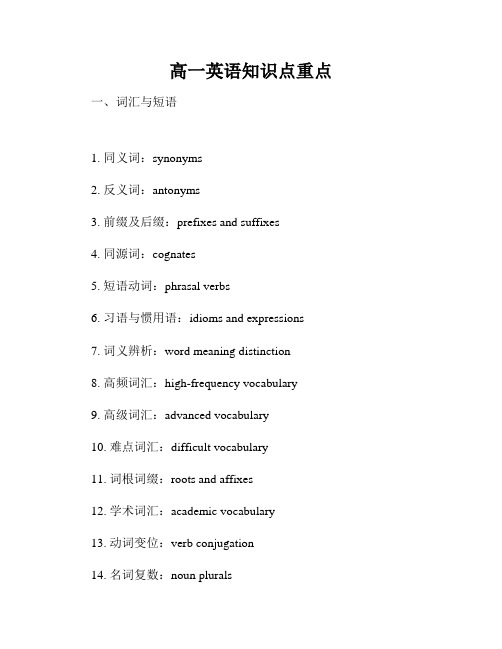
高一英语知识点重点一、词汇与短语1. 同义词:synonyms2. 反义词:antonyms3. 前缀及后缀:prefixes and suffixes4. 同源词:cognates5. 短语动词:phrasal verbs6. 习语与惯用语:idioms and expressions7. 词义辨析:word meaning distinction8. 高频词汇:high-frequency vocabulary9. 高级词汇:advanced vocabulary10. 难点词汇:difficult vocabulary11. 词根词缀:roots and affixes12. 学术词汇:academic vocabulary13. 动词变位:verb conjugation14. 名词复数:noun plurals15. 形容词比较级与最高级:comparative and superlative adjectives二、语法1. 简单句与复合句:simple sentences and compound sentences2. 主语与谓语动词的一致性:subject-verb agreement3. 名词性从句:noun clauses4. 宾语从句:object clauses5. 同位语从句:appositive clauses6. 定语从句:adjective clauses7. 状语从句:adverbial clauses8. 并列连词:coordinating conjunctions9. 从属连词:subordinating conjunctions10. 过去时与过去完成时:past tense and past perfect tense11. 现在时与现在完成时:present tense and present perfect tense12. 将来时与将来完成时:future tense and future perfect tense13. 被动语态:passive voice14. 直接引语与间接引语:direct and indirect speech15. 所有格:possessive case三、阅读理解1. 主旨大意题:main idea questions2. 细节理解题:detail questions3. 推理判断题:inference questions4. 词义推测题:vocabulary inference questions5. 修辞手法题:figurative language questions6. 观点态度题:opinion and attitude questions7. 排列顺序题:sequence questions8. 作者意图题:author's purpose questions9. 标题填空:fill in the title10. 段落大意:paragraph summary四、写作技巧1. 书信写作:letter writing2. 简历撰写:resume writing3. 图表描述:describing charts and graphs4. 议论文写作:argumentative essay writing5. 叙事文写作:narrative essay writing6. 描述文写作:descriptive essay writing7. 复习文写作:review writing8. 演讲稿写作:speech writing9. 祝贺信写作:congratulation letter writing10. 劝告信写作:advice letter writing。
- 1、下载文档前请自行甄别文档内容的完整性,平台不提供额外的编辑、内容补充、找答案等附加服务。
- 2、"仅部分预览"的文档,不可在线预览部分如存在完整性等问题,可反馈申请退款(可完整预览的文档不适用该条件!)。
- 3、如文档侵犯您的权益,请联系客服反馈,我们会尽快为您处理(人工客服工作时间:9:00-18:30)。
高一英语重点知识汇总汇总高一英语知识要点1.be good to对待…好对比:be good for对…有好处2.add up特别注意有关的几个词组:add…to… 给…添加…, 把…加到…上add to 增添,增加add up 把…加起来add up to 合计达…*If you add 5 to 5, you get 10.*She added sugar to the tea.*If you add some pictures to your report, that will be better.*The bad weather added to our difficulties.*Every time I add these figures up, I get a different answer.*His monthly income added up to no more than $1,000.翻译:请对我的话做些补充。
Please a dd something to what I’ve said.请帮我把这些数字加起来。
Please add up these figures for me.3.upset(upset,upset)vt.使难过、不安;adj.难过的,不安的*Losing the game upset her.*His friend’s death upset him very much.*I’ll be really upset if you don’t come.*I was very upset to see she was hurt.*You look upset---what’s happened?4.ignore vt.忽略,没注意;不理睬*Even the most careful person may ignore it.*It’s a question that can be easily ignored.*I greeted him, but he ignored me.5.calm adj.平静的,镇静的;风平浪静的vt.使平静*After the storm, the sea was calm again.*Keep calm in time of danger.*Don’t be nervous; calm yourself, please.calm down平静下来*I told him to calm down.宾语从句宾语从句就是在复合句中作宾语的名词性从句,通常放在主句谓语动词(及物动词)或介词之后。
1. 作动词的宾语。
(1) 由that引导的宾语从句(that 通常可以省略)例如:I heard that be joined the army.(2) 由what, whether (if) 引导的宾语从句例如:1) She did not know what had happened.2) I wonder whether you can change this note for me.(3) 动词+间接宾语+宾语从句例如:She told me that she would accept my invitation.2. 作介词的宾语。
例如:Our success depends upon how well we can cooperate with one another.3. 作形容词的宾语。
例如:I am afraid (that) I’ve made a mistake.That 引导的从句常跟在下列形容词后作宾语:Anxious, aware, certain, confident, convinced, determined, glad,proud, surprised, worried, sorry, thankful, ashamed, disappointed,annoyed, pleased, hurt, satisfied, content 等。
也可以将此类词后的that 从句的看作原因状语从句。
4. It 可以作为形式宾语。
It 不仅可以作为形式主语,还可以作为形式宾语而真正的宾语that 从句则放在句尾,特别是在带复合宾语的句子中。
例如:We heard it that she would get married next month..5. 后边不能直接跟that 从句的动词。
这类动词有Allow, refuse, let, like, cause, force, admire,condemn, celebrate, dislike, love, help, take, forgive等。
这类词后可以用不定式或动名词作宾语,但不可以用that引导的宾语从句。
例如:I admire their winning the match. (right)I admire that they won the match. (wrong)6. 不可用that从句作直接宾语的动词。
有些动词不可用于“动词+间接宾语+that从句“结构中,常见的有Envy,order, accuse, refuse, impress, forgive, blame, denounce, advise,congratulate等。
例如:He impressed the manager as an honest man. (right)He impressed the manager that he was an honest man. (wrong)7. 否定的转移若主句谓语动词为Think, consider, wuppose, believe, expect, fancy,guess, imagine等,其后的宾语从句若含有否定意义,一般要把否定词转移到主句谓语上,从句谓语用肯定式。
例如:I don’t think th is dress fits you well.(我认为这件衣服不适合你穿。
)高一英语必备知识点1. be fond of “喜爱,爱好” 接名词、代词或动词的-ing形式。
He’s fond of swimming. 他喜欢游泳。
Are you fond of fresh vegetables. 你喜欢新鲜蔬菜吗?He is fond of his research work. 他喜爱他的研究工作。
2. hunt for = look for寻找I have found the book I was hunting for.我找到了那本我在找的书。
hunt for a job 找工作3. in order to/so as to:这两个词组都可引导不定式作目的状语, in order to可放于句首, so as to则不能, 其否定形式为in order not to / so as not to.He went to Beijing in order / so as to attend an important meeting.In order to be noticed, he shouted and waved to us.为了让我们注意他, 他朝我们又是叫喊又是挥手。
4. care about1) 喜欢,对……有兴趣 = care forShe doesn’t care about money.她不喜欢钱。
2)关心 = care forShe thinks only of herself. She doesn’t care about other people.她只考虑自己。
她不关心别人。
3)在乎,在意(接从句或不接任何成分)These young people care nothing about what old people might say.这些年轻人根本不在乎老人说的话。
5. such as 意为“诸如……”,“像……”,是用来列举人或事物的。
She teaches three subjects, such as physics and chemistry.她教三门科目,像物理、化学。
6. drop a line 留下便条, 写封短信7. make yourself at home 别客气;随便;无拘束If you get to my house before I do, help yourself to a drink and make yourself at home.如果你在我之前到我家,自己喝点饮料,随便一点。
8. stay up 不睡;熬夜(1) I'll be late home, don't stay up for me.我将回家很晚,不要等我了。
(2) He stayed up reading until 2:00 in the morning.他熬夜看书直到凌晨两点。
9. come about 引起;发生;产生(1)How did the accident come about?这场事故是怎么发生的?(2) They didn't know how the change had come about.他们不知道这个变化是怎样产生的。
